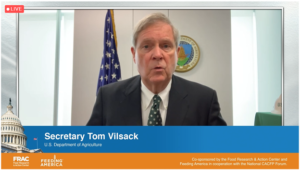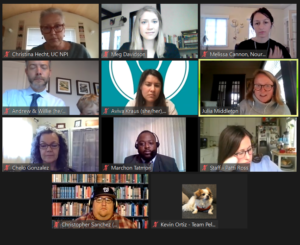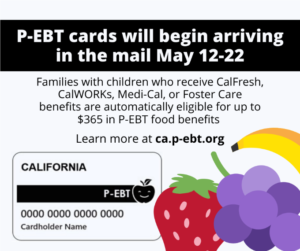Government Action Offers Some Relief, but More is Needed to Prevent Widespread Hunger
For the 37 million Americans who were struggling with food insecurity before this crisis unfolded, and for the millions more who were just barely making ends meet, COVID-19 has meant an unfathomable increase in hunger and hardship.
While our Programs and Operations teams work tirelessly to launch new pop-up pantries to respond to the growing demand for food in our community, our Policy & Advocacy team has been collaborating with elected leaders and social safety net administrators to ensure that all our neighbors can feed themselves and their families during this challenging time.
Federal Response
The Food Bank, along with anti-hunger advocates at the national and state level, has been in regular contact with our members of Congress since the beginning of the crisis to push for essential resources and nutrition assistance for our communities. We applaud our federal leaders for swiftly passing measures to provide direct aid to individuals and families. Without strong economic security measures, food insecurity will only intensify. These bills also include key investments for:
- food security through SNAP (formerly food stamps);
- food for kids who usually rely on free meals at school;
- USDA commodities for food banks through The Emergency Food Assistance Program (TEFAP).
Details of the first three stimulus bills are linked here:
Despite these investments, we believe that lawmakers missed a critical opportunity to serve the dual function of stimulating the economy and feeding hungry Americans by increasing the maximum SNAP benefit by 15% and increasing the minimum benefit to $30. Every $1 of SNAP benefits spent generates between $1.50-$1.80 in economic activity.
State & Local Response
The stimulus bills passed by Congress also removed much of the administrative red tape that comes with operating federal nutrition programs like SNAP, WIC (Women, Infant, and Children), and Free and Reduced-Price School Meals. These federal programs are administered at the local level, so California’s safety net program administrators have been working around the clock to ensure a smooth rollout of these administrative flexibilities to provide food relief for those impacted by the pandemic. We are working closely with our state and county partners to prevent any of our vulnerable neighbors from falling through the cracks.
Earlier this month, Governor Newsom issued an executive order that eased rules for applicants to social service programs, including CalFresh, Medi-Cal health coverage, welfare through CalWorks, and in-home support services. The state has also taken action towards eliminating known barriers to accessing CalFresh, including waiving the interview requirement and pursuing online food purchase using EBT. These changes come as an unprecedented wave of new CalFresh applications are being submitted each week.
While the state Legislature is on recess through April 13th, our state Senators and Assemblymembers have been supporting our efforts here in the community. Supervisors in both Marin and San Francisco counties have been engaged with our response effort and have worked to elevate our efforts in the community. We’re grateful for the support of our elected officials who have also stepped up by volunteering at our Pop-up pantries, sharing resources and referrals with their constituents via social media and newsletters, and championing state budget requests to shore up food bank emergency infrastructure.
Take Action Now
It will take a concerted effort from advocates, community members, impacted individuals, and elected leaders to prioritize policy solutions that help all Californians put food on the table during this crisis. We can #EndHungerTogether.
Please, call your lawmakers (202-224-3121) and urge them to include new investments in SNAP that will help the economy rebound from the impact of the pandemic and are critical to ensuring the well-being of vulnerable people. Ask them to:
- boost the SNAP maximum benefit;
- increase the minimum monthly SNAP benefit to $30;
- suspend any administrative actions that eliminate or weaken SNAP benefits.
“These social safety net programs are so important for families — especially during this crisis. We don’t want Californians who rely on these services to lose them.” - Governor Gavin Newsom




 The new remote format makes it easier for advocates who were previously unable to participate in the vital activity of meeting directly with our elected leaders because of the challenge of paying for travel to D.C. Our Policy & Advocacy team arranged meetings with our Members of Congress and fellow community-based organizations from our district to share the local impact of Federal policies and request their support for policies and funding to alleviate hunger across their district.
The new remote format makes it easier for advocates who were previously unable to participate in the vital activity of meeting directly with our elected leaders because of the challenge of paying for travel to D.C. Our Policy & Advocacy team arranged meetings with our Members of Congress and fellow community-based organizations from our district to share the local impact of Federal policies and request their support for policies and funding to alleviate hunger across their district.
 “It has helped me a lot – you wouldn’t believe it!”
“It has helped me a lot – you wouldn’t believe it!”
Share